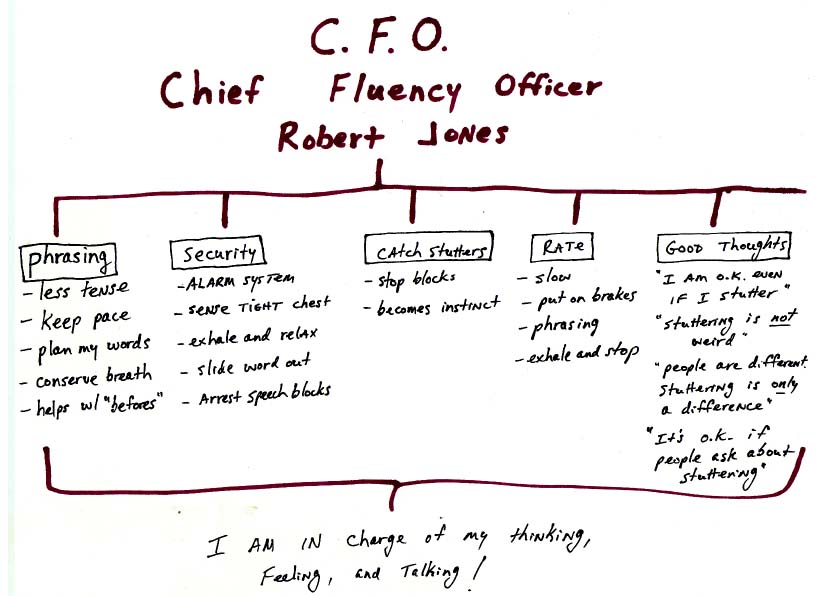CFO: Chief Fluency Officer
 |
About the presenters: In addition to owning a full-time private practice dedicated to fluency disorders, Tim Mackesey has taught the graduate-level Fluency Disorders course at Georgia State University. An SLP since 1992, he travels internationally presenting workshops on early intervention, stuttering treatment, and cognitive therapy. Tim is published and has been interviewed on a number of television and radio programs related to stuttering. He has been selected as a Board Recognized Specialist in Fluency Disorders and Specialist Mentor by ASHA. As a certified master practitioner of Neuro Linguistic Programming, Tim integrates numerous unique strategies into therapy and teaching
Robert Jones is a 5th grader from Atlanta wtih interests including Harry Potter books, theater and drama, dance, singing, and reality TV shows. |
C.F.O. - Chief Fluency Officer
by Tim Mackesey and Robert Jones
from Georgia, USA
This is a story about a 10 year-old boy, named Robert Jones, becoming his own CFO. The acronym CFO is usually reserved for the Chief Financial Officer of a corporation. The Chief Fluency Officer is responsible for how he thinks, feels, and talks. Like a company has an organizational flowchart, we created one for the CFO. The flowchart below lists many of the speech techniques, positive thinking, and conversational skills necessary to hold the title of CFO.
Mission Statement for CFO
All corporations have a mission statement that clearly states its purpose and intentions. As my own Chief Fluency Officer I (Robert) have a mission. I will use a technique called a "before" to notice and release a block before it happens - this is my security department. My other techniques on the flowchart also help me be the CFO. I am my own public relations director; so if anyone asks about stuttering, I educate people and it is doesn't bother me. I am more than stuttering. I am in control of my brain and how I think about stuttering. I keep getting more fluent and plan continued improvement.

Tim: When I met Robert I immediately noticed a bright young man with a big vocabulary, many interesting things to talk about, and a passion for learning. He often had a significant novel, such as Harry Potter, in the lobby of my office. Robert's poetry is quite impressive. I learned that he is in the Target program (gifted program) at school as he excels in most every subject. When excited, Robert would talk fast and have loud speech blocks that sounded like "uh uh."
Using mapping (Harris, 2003) - like the flowchart - was very helpful with Robert. It helps close the "knowing-doing gap." When you read the map, note that the ideas flow vertically from top to bottom. For example, under "security" he now knows that he has an "alarm system" that senses his chest tightening (anticipatory anxiety) then he exhales and relaxes as he voices the word slides out. Robert can clearly explain what provoked his stuttering, how to help himself, how thinking/feeling and stuttering are related, and so on. He is truly empowered- a CFO.
Robert: I have stuttered since kindergarten. I had speech therapy in the school since first grade. I just started 5th grade. Before I met Tim I stuttered many times a day. They were loud blocks. Kids would constantly ask me why I stutter. It used to bother me when they kept asking. Now I handle any questions without any frustration. I am my own Public Relations Director.
Tim: When we met, Robert talked turbo charged - really fast. He has learned traditional techniques such as phrasing and rate control through exercises, exciting speech games, and public speaking exercises. We have also been on field trips to the shopping mall. Robert has learned to sense blocks before they happen- this takes discipline and paying attention to thoughts and to feelings in his chest. He has learned to stop and begin speech while exhaling- this is called a "before."
Robert has also changed his attitude about stuttering. Instead of being frustrated by questions, he is calm and poised. His blocks are rare and they are tiny in comparison to the old ones. Notice on his map/flowchart that there is nothing about avoiding talking or any tricks. His purpose and intention is to be a CFO - totally in charge.
Robert: When I started with Tim, he asked me questions until we found a mental equation I had: "Stuttering = I am weird." Now I know that "stuttering = just a difference (not weird)." I am in the gifted program, have many interests, and I am more than stuttering. I went to a drama camp this summer. In the camp I got to sing, dance, and had speaking parts. I talked great and had a lot of fun!
Tim: Robert's old mental equation of "stuttering = weird" is called a Complex Equivalent (Bandler, 1976). This is a personalization of stuttering that likely came from his interpretation of all the questions about his stuttering in the past. The CFO's security department had to remove this from his brain- and it did!
The word "meaning" comes from German and means to hold in mind. If we hold a negative meaning about stuttering in our mind, we will move through our day with anxiousness and make attempts to avoid talking and prevent it. (I did that myself for more than 20 years.) Anticipatory anxiety, the feeling in his chest that preceded his blocks and his eventual "before" strategy, came from such thinking about stuttering. Reframing, or changing the meaning, of stuttering was critical for the CFO (Robert) to achieve the fluency and the confidence he now has.
Bibliography
Bandler, Richard & Grinder, John (1975, 1976). The Structure of Magic, Volumes I & II: A book about language and therapy. Palo Alto, CA. Science and Behavior Books
Harris, Ian & Caviglioli, Oliver (2003). Think it-Map it: How schools use mapping to transform teaching and learning. Stafford, UK. Network Educational Press
August 2004

